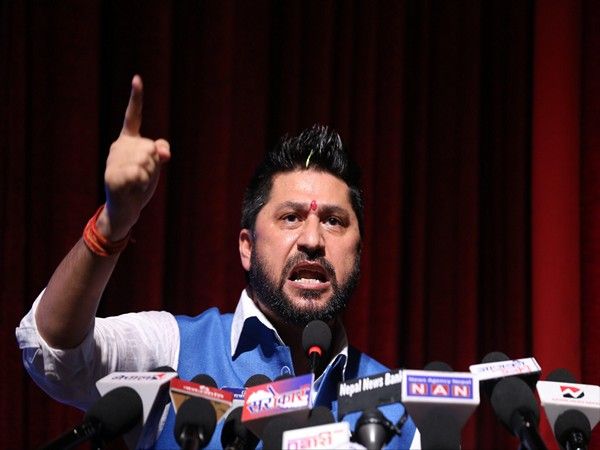
In a case involving a cooperative fraud, a Nepalese High Court has ordered the imprisonment of former Home Minister Rabi Lamichhane.
Late on Friday night, the Tulsipur High Court’s Butwal bench overturned the District Court of Rupandehi’s ruling and ordered Lamichhane to be imprisoned.
Lamichhane was ordered to be remanded in jail earlier Friday evening by a joint bench of justices consisting of Ramesh Dhakal and Swikriti Parajuli. The bench also maintained the district court’s judgment to place Chhabilal Joshi, the former director of Gorkha Media Network and Deputy Inspector General (DIG), in judicial custody.
Deputy Registrar Harigopal Gyawali informed to ANI over the phone that “the order was given by the bench of Ramesh Dhakal and Swikriti Parajuli annulling the verdic of the District Court Rupandehi to release him in bail.”
On the condition that he show up on the appointed dates, the district court freed Lamichhane on NRs 10 million bond on January 26. Later, Lamichhane appealed the lower court’s ruling to the high court.
At that point, the court had said, “Given that there is no reasonable basis to believe the defendant did not commit the alleged crime based on the immediately available evidence, the matter will be further examined during the trial.”
In an attempt to reverse this ruling, the District Government Attorney’s Office later filed an appeal with the supreme court. It said that because of the gravity of the accusations and the evidence against him, Lamichhane had to stay in detention. All three cases were heard jointly on Friday.
The Rastriya Swatantra Party (RSP) founder and former home minister has been involved in cooperative fraud cases in Kathmandu, Kaski, Butwal, and Chitwan.
In Butwal (Supreme Cooperative), Chitwan (Sahara Cooperative), Kathmandu (Swarnalaxmi Cooperative), Kaski (Suryadarshan Cooperative), and Parsa (Sano Paila Cooperative), Lamichhane has been the subject of cases. Lamichhane has been charged with transferring funds to Gorkha Media Network, the company that operated the now-defunct Galaxy 4K Television, in each of the districts.
On October 18, 2024, a team from the Central Investigation Bureau detained Lamichhane at his party office in Kathmandu on suspicion of organized crime and embezzlement of cooperative money.
Charges of money laundering, joint fraud, and organized crime have been refuted by the former Home Minister and founder of the RSP, the fourth-largest party in parliament.
A special investigation by a parliamentary committee established in 2024 to look into the cooperative scandal charged Lamichhane for embezzling millions of rupees as part of the scheme. The committee’s report was compiled and presented to the parliament on September 16, 2024.
The parliament discussed and legally approved the seven-member committee that was established on May 28 of last year. According to the report’s findings, cooperatives that transacted using falsified documentation provided Gorkha Media with millions of rupees.
In violation of cooperative law, former Home Minister Lamichhane was managing director of Gorkha Media, the parent business of the now-defunct Galaxy 4K Television, at the time savings from cooperatives were invested.
Additionally, the sitting lawmaker confirmed that he was accepting a sweat stake in Gorkha Media.
After declaring the creation of the Rastriya Swatantra Party later in 2022, Lamichhane joined politics and ran for office in the federal parliament the same year. The television channel officially ceased operations last year after failing to pay its employees.
In addition, the committee’s findings suggested that the government file a lawsuit against all parties engaged in the money transfers from other cooperatives to Gorkha Media.
Several cooperatives, including Suryadarshan from Pokhara, Supreme from Butwal, Swarnalaxmi from Kathmandu, Sahara Chitwan from Chitwan, and Sanopaila from Birgunj, contributed millions of rupees to Gorkha Media.
According to the investigation, GB Rai, Kumar Ramtel, Rabi Lamichhane (who was the managing director at the time), and Chhabi Lal Joshi actively participated in the misappropriation. According to the committee report, Rai’s participation is shown by the fact that he and Lamichhane ran a joint bank account and wrote checks totaling millions of dollars.
“Every business has its own goals and culture. These institutions’ primary duties are to promoters and shareholders. The research emphasized that those in positions of authority, such as managing directors, promoters, and shareholders, cannot be exempt from accountability for the funds received by the business.
The committee also spent more than ten hours in an inquiry session with Lamichhane, the current chairperson of the Rastriya Swatantra Party (RSP) and a former home minister, as part of the probe. He said throughout the discussion that he was not aware that the funds transferred to Gorkha Media were from cooperatives, namely savings of around 50,000 individuals.
Lamichhane further argued the case by saying he did not know Rabi Lamichhane, who had borrowed money from Supreme Cooperatives and Suryadarshan. He had been subjected to 50 questions by the committee over his suspected role in the scheme.
House Speaker Devraj Ghimire ordered the government to put the findings of the parliamentary special investigation committee, which was established to look into the theft of cooperative funds, into effect once the report was approved and tabulated. The Parliament Secretariat was then instructed by Speaker Ghimire to forward the report to the government for execution.
The Nepali Congress demanded the creation of a parliamentary investigation committee, claiming that Rabi Lamichhane, the president of the Rastriya Swatantra Party and the then-deputy prime minister and home minister, was involved in the embezzlement of cooperative savings. On May 28, 2024, the House of Representatives (HoR) established the committee, which is led by CPN-UML lawmaker Thapa. The committee’s original three-month term was subsequently extended by 15 days by the House of Representatives.
The parliamentary committee was composed of Dilendra Badu of the Nepali Congress, Ishwari Neupane, Sabitra Bhusal of the UML, Lekhnath Dahal of the CPN (Maoist Center), Shishir Khanal of the RSP, and Dhruba Bahadur Pradhan of the Rastriya Prajatantra Party.